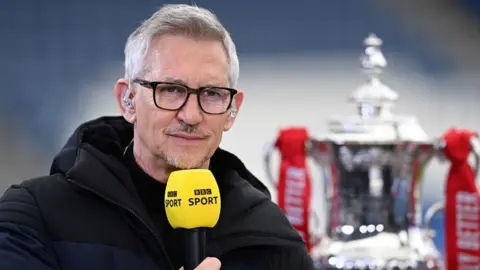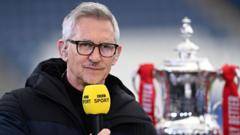Paul Glynn and Steven McIntosh
Culture reporters
Gary Lineker has confirmed he will leave the BBC after presenting his final episode of Match of the Day on Sunday.
The 64-year-old had been expected to front future coverage of the FA Cup and World Cup, but was criticised last week after sharing a social media post about Zionism that included an illustration of a rat, historically used as an antisemitic insult.
In a statement on Monday, Lineker reiterated that he didn’t know about the post’s antisemitic connotations, adding that he “recognises the error and upset that I caused, and reiterate how sorry I am”.
He added: “Stepping back now feels like the responsible course of action.”
The presenter has previously attracted criticism for his social media posts, but the latest example was thought to be the last straw for bosses, who considered his position untenable, the BBC’s culture and media editor Katie Razzall said.

 Getty Images
Getty Images
The BBC’s director general Tim Davie, said in a statement: “Gary has acknowledged the mistake he made. Accordingly, we have agreed he will step back from further presenting after this season.
“Gary has been a defining voice in football coverage for the BBC for over two decades. His passion and knowledge have shaped our sports journalism and earned him the respect of sports fans across the UK and beyond. We want to thank him for the contribution he has made.”
- A sorry end to Gary Lineker’s BBC career
- Live updates: Host to leave the BBC after social media ‘error’
- From football sensation to headline-hitting presenter
Lineker said: “Football has been at the heart of my life for as long as I can remember – both on the pitch and in the studio.
“I care deeply about the game, and about the work I’ve done with the BBC over many years. As I’ve said, I would never consciously repost anything antisemitic – it goes against everything I stand for.
“However, I recognise the error and upset that I caused, and reiterate how sorry I am. Stepping back now feels like the responsible course of action.”
In addition to the written statement, the former footballer also posted a video on Instagram.
He said he would “never, ever have shared” the post if he had seen the emoji, which he said “has awful connotations”.
“I would like once again to say I’m sorry unreservedly for the hurt and upset caused. It was a genuine mistake and oversight,” he continued. “But I should have been more diligent. I know that.”
Lineker said he had “stood up for minorities and humanitarian issues, and against all forms of racism all of my life, including, of course, antisemitism, which I absolutely abhor”.
He told his followers it was “best for all concerned” that he “step down from BBC presenting duties altogether”.
Lineker described his 30 years at the BBC as a “pleasure and a huge privilege”, adding that Match of the Day had become “an integral part of my life”.
The presenter concluded by saying his relationship with the BBC had been “long and wonderful”, but that it was “time for the organisation and myself to go our separate ways”.
‘Difficult and emotional week’
Writing to staff, BBC Sport director Alex Kay-Jelski said he “appreciated the last week has been difficult and emotional for many of you”.
He said it was “sad to be saying goodbye to such a brilliant broadcaster” and thanked Lineker “for his years of service”.
He concluded: “Let’s finish the season strongly with Gary’s final show, enjoy an incredible summer of sport and look forward with excitement to what lies ahead.”
Lineker and the BBC had announced last year that he would leave Match of the Day at the end of this season, which concludes on Sunday.
But he had been due to remain at the forefront of the BBC coverage of the men’s FA Cup and the World Cup in 2026.
The former England striker replaced Des Lynam as the corporation’s main presenter of Match of the Day in 1999.
In a recent interview with the BBC’s Amol Rajan he said he had a sense during his latest contract negotiations that the BBC wanted him to step down from the Premier League highlights show.
Roger Mosey, former director of BBC Sport and ex-head of BBC television news, told Radio 4’s Today programme on Monday he believed the “difficulty” was that “you can’t both be the highest paid presenter and be a social media activist”.
“I think it’s always been a problem that allowing Gary to do the amount of social media he did and also be the BBC’s highest-paid presenter was never going to be easy,” he said.







